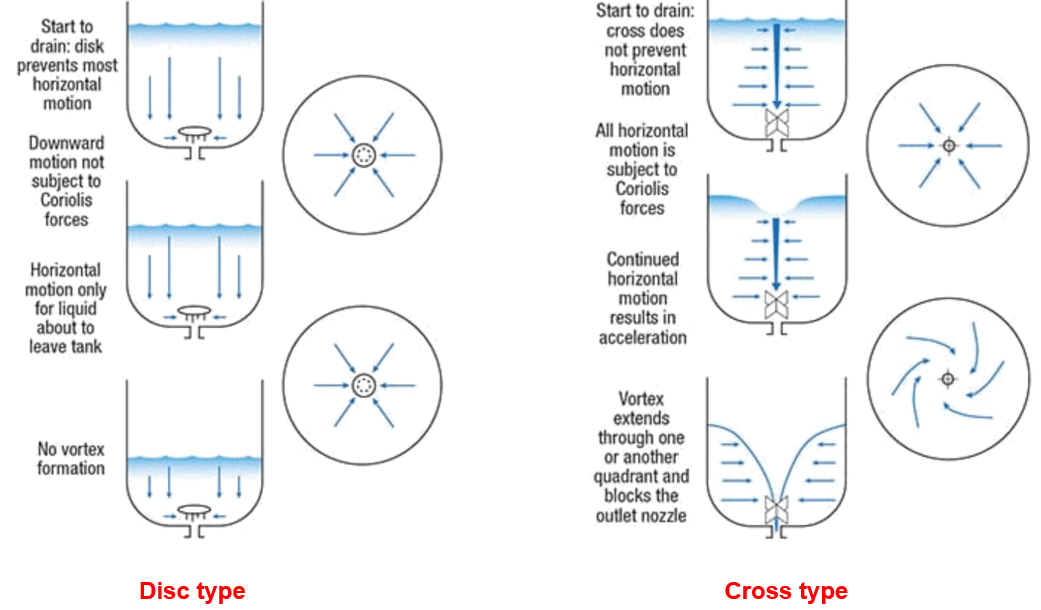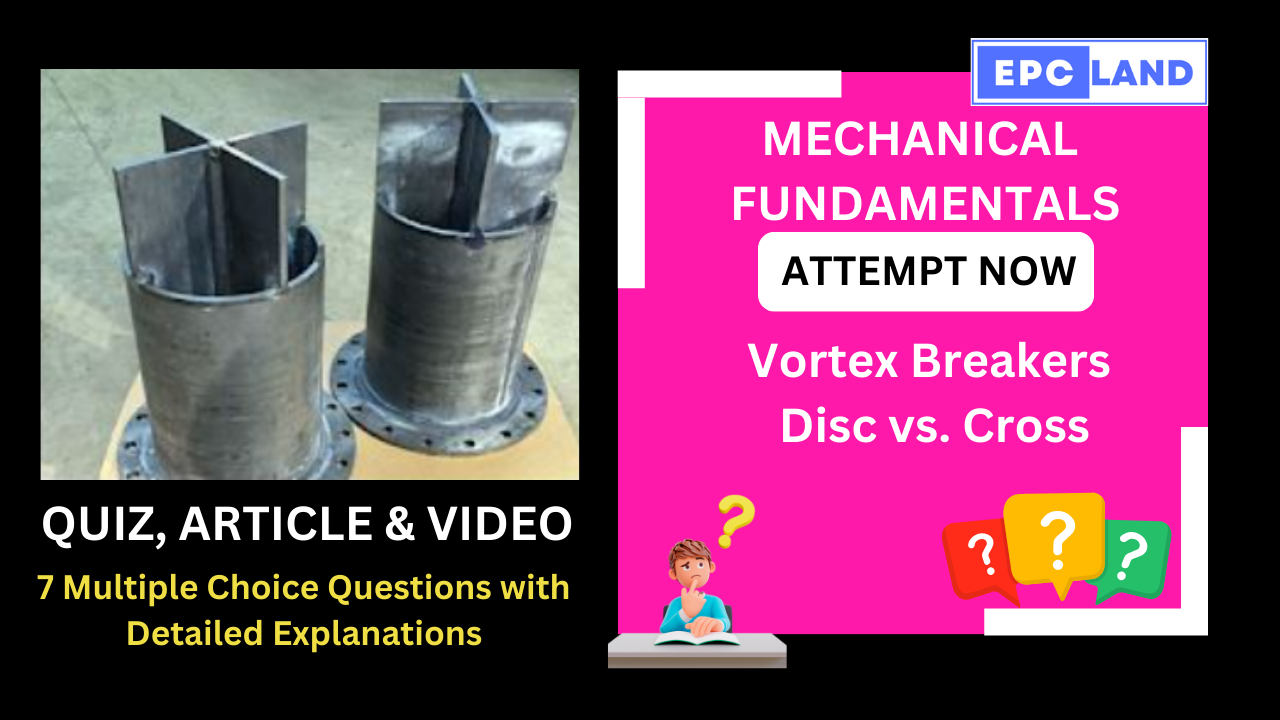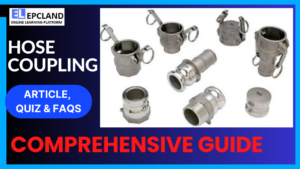
1. Purpose of Vortex Breakers
Why are vortex breakers used in engineering when emptying a tank?
Explanation: Vortex breakers are used to prevent the formation of a vortex, which can draw air into the discharge stream and cause disruptions in flow, leading to stress on equipment.
2. Types of Vortex Breakers
What are the two main types of vortex breakers mentioned in the provided information?
Explanation: The two main types of vortex breakers mentioned are Disc and Cross.
3. Disc Type Mechanism
How does a disc-type vortex breaker prevent vortex formation?
Explanation: A disc-type vortex breaker prevents vortex formation by obstructing axial flow.
4. Cross Type Mechanism
How does a cross-type vortex breaker prevent vortex formation?
Explanation: A cross-type vortex breaker prevents vortex formation by disrupting rotational flow.
5. Effectiveness of Disc vs. Cross
How does the effectiveness of disc-type vortex breakers compare to cross-type vortex breakers?
Explanation: Disc type vortex breakers are highly effective compared to cross type, which is not as effective.
6. Flow Restriction
How does the flow restriction compare between disc-type and cross-type vortex breakers?
Explanation: Cross type vortex breakers have significant flow restriction compared to minimal flow restriction in disc type.
7. Best Choice of Vortex Breaker
What is the best choice of vortex breaker in most cases, according to the information provided?
Explanation: In most cases, a disc type vortex breaker is the best choice for its effectiveness and minimal flow rate reduction.
Don’t miss the Related Topics on Vortex Breaker
| Related Topics on Vortex Breaker |
|---|
| Applications of Vortex Breakers |
| How Cooling Towers Work |
| Understanding the Cooling Towers |
Short Article on Vortex Breakers: Disc vs. Cross
Vortex Breakers: Disc vs. Cross
Vortex breakers are devices used in engineering to prevent the formation of a vortex when emptying a tank. This is important for several reasons, including:
- Preventing air entrainment: Vortices can draw air into the discharge stream, which can be undesirable in many processes.
- Improving flow rate: Vortices can disrupt the flow of liquid, leading to reduced discharge rates.
- Protecting equipment: Vortices can create high stresses on downstream equipment, such as pumps and valves.
There are two main types of vortex breakers:
- Disc type: This type of vortex breaker consists of a flat disc mounted above the outlet nozzle. The disc obstructs the axial flow of liquid, preventing the formation of a vortex.
- Cross type: This type of vortex breaker consists of a cross-shaped structure mounted above the outlet nozzle. The cross is designed to disrupt the rotational flow of liquid, preventing the formation of a vortex.
Here’s a comparison of disc and cross vortex breakers:
| Feature | Disc type | Cross type |
|---|---|---|
| Effectiveness | Highly effective | Not effective |
| Mechanism of action | Obstructs axial flow | Disrupts rotational flow |
| Flow restriction | Minimal | Significant |
| Application | Most common | Not recommended |
Here are some additional points to consider:
- Cross vortex breakers are often installed because they are less expensive than disc vortex breakers. However, they are not as effective and can actually contribute to vortex formation.
- Disc vortex breakers are more effective, but they can cause a slight reduction in flow rate. However, this reduction is usually insignificant and can be mitigated by using a larger disc.
- In most cases, a disc vortex breaker is the best choice.
Table of Contents
Don’t miss the Course on Effective Isometrics Management: Check Now
Enrollment Link
Recommended courses (Published on EPCLand)
- Complete Course on Piping Engineering
- Basics of Piping Engineering
- Piping Layout Engineering
- Piping Material Engineering
- Piping Stress Analysis
- Material Requisitions
- Piping Material Specifications
- Valve Material Specifications
- Plant Design & Layouts-OISD 118
- Isometric Management
Library of Technical Articles
Don’t miss out the collection of 15+ articles on following topics:
- Basics of Oil and Gas Industry
- Valves
- Testing
- Tank
- Piping Bulk Items
- Pipe
- Metallurgy
- Piping Materials
- Layout
- Instrumentation
- Heat Exchanger
- Type of Contracts
- Codes and Standards
- ASTM Standards
- Articles on Piping Specialty Items
Video details of Complete Course on Piping Engineering
Why Enroll in the EPCLand
Proven Track Record– PTR
Activities & Achievements before launching EPCLand
- Published more than 50+ short courses
- 3000+ Enrolments
- More than 3,500,00 Minutes of watch hours in the last 2 years
- 4000+ Students in 100+ Countries
- Rating of 4+ out of 5
- 1000+ YouTube Videos
- 8K+ Subscribers
What Students will Learn
- Codes & Standards of the Energy Sector
- Piping Material Engineering
- Piping Layout Engineering
- Stress Analysis
Interesting facts
- All the published courses have been developed by Industry Experts with more than 2 decades of experience
- Content is based on Practical experience and real-time problems.
- Content is designed and organized in such a manner that it can be easily grabbed.
- Complete website, Blogs and Quiz sections are Planned, Designed and published by myself (About me: Atul Singla)
- Complete flexibility of Time & Location, Students can access the content from anywhere & anytime
- Moreover, once enrolled, the content can be access as many times as you want, which helps in understand the fundamentals in a better way.
Conclusion
In conclusion, our courses are meticulously crafted by industry experts with over two decades of hands-on experience. The content is rooted in practical knowledge, addressing real-time problems. The material is thoughtfully designed and organized for easy comprehension. Every aspect, from the website to blogs and quizzes, has been planned, designed, and executed by Atul Singla, ensuring a comprehensive and seamless learning experience. With the flexibility of accessing the content at any time and from any location, students have the freedom to learn on their terms. Furthermore, enrollment grants unlimited access, allowing learners to revisit the material as often as needed, fostering a deep understanding of the fundamentals.



